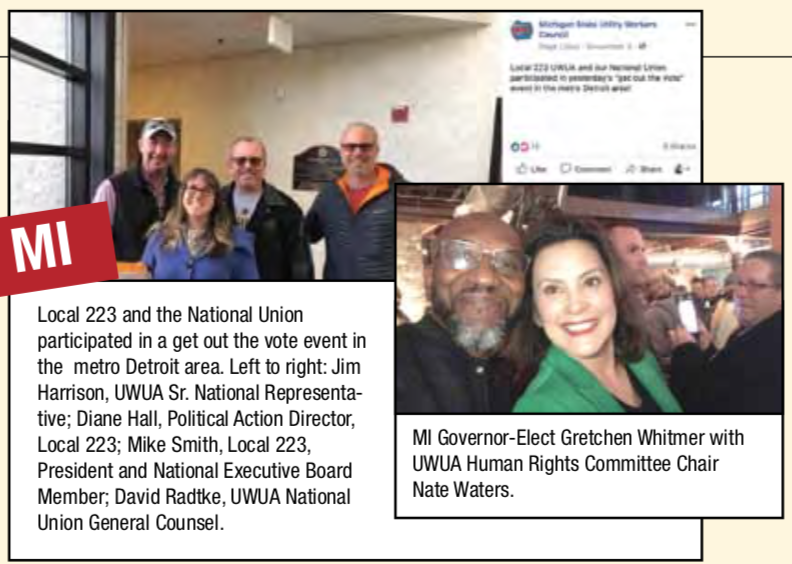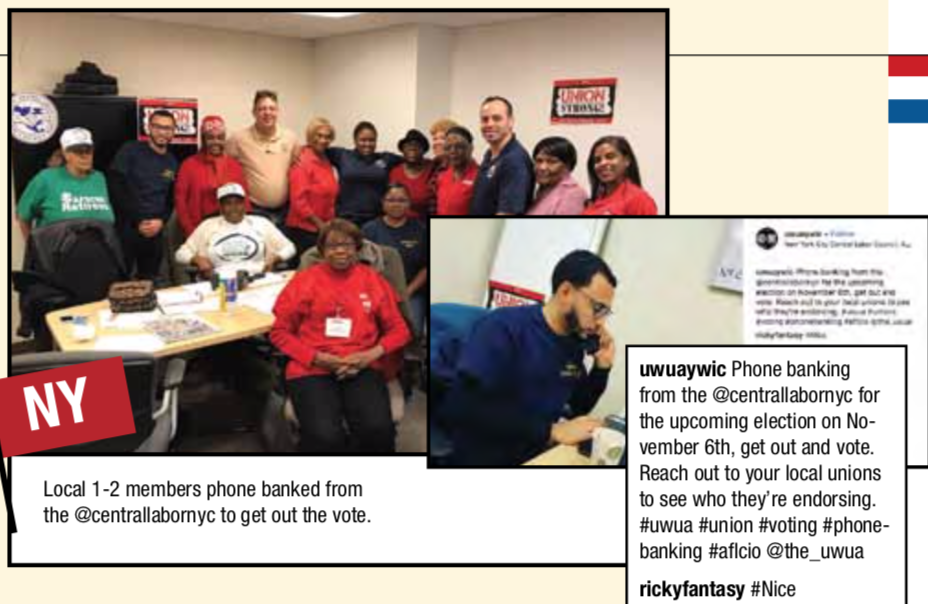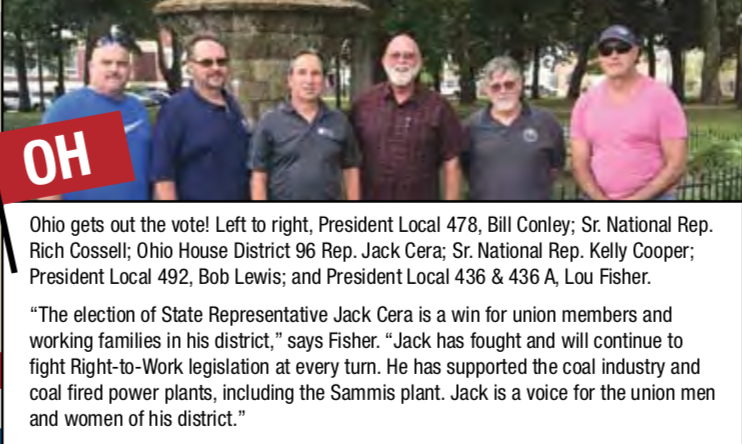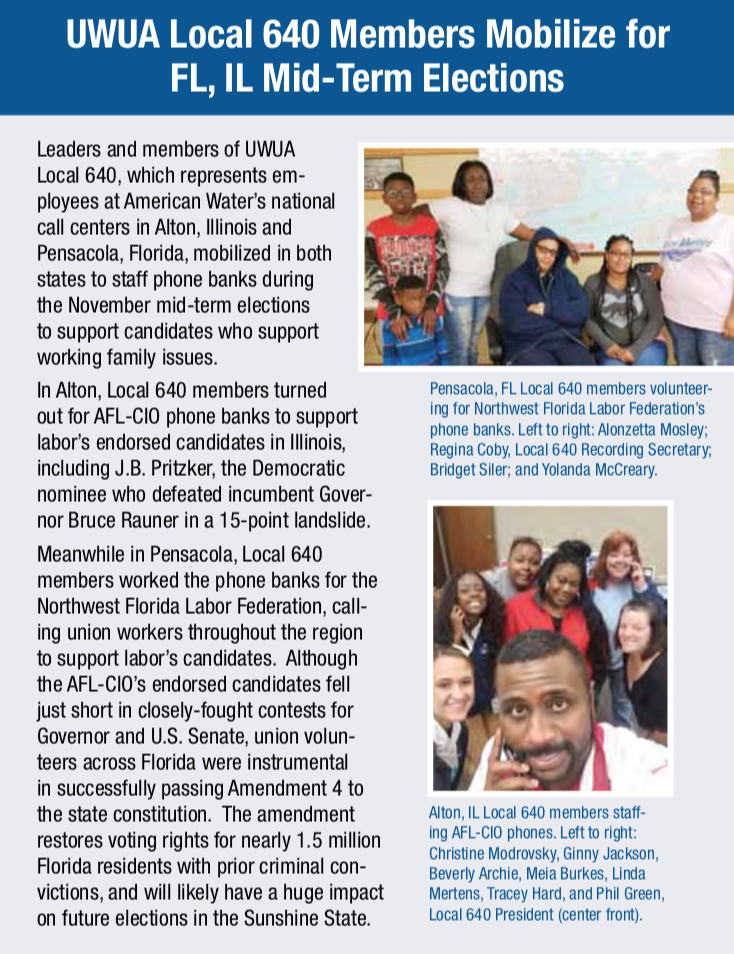2018 ELECTION ROUNDUP
After two tumultuous years in which domestic politics have dominated the national scene, voters at last headed to the polls this past November 6th to send a message, to hold leaders to account, and to adjust the country’s trajectory for the next two years. In the run-up to Election Day, the UWUA’s national leadership charted a course for the union, seeking to double and triple down on past efforts at getting out the vote, educating fellow union members on the issues, and making sure members’ voices were heard.
 As a result, the UWUA fielded nearly 60 release staff — members released from their jobs to work either full or part-time on electoral efforts. In addition, dozens of utility worker volunteers from across the country added their voices, pitching in whenever and wherever they were able, some even turning out for events in states far removed from the nearest UWUA local! It just goes to show — wherever a utility worker goes, the power of the union goes with them!
As a result, the UWUA fielded nearly 60 release staff — members released from their jobs to work either full or part-time on electoral efforts. In addition, dozens of utility worker volunteers from across the country added their voices, pitching in whenever and wherever they were able, some even turning out for events in states far removed from the nearest UWUA local! It just goes to show — wherever a utility worker goes, the power of the union goes with them!
Utility Workers get out the vote
Across the country, in response to this rallying cry, national staff, local officers, and UWUA members worked diligently, staffing phone banks, canvassing union households in neighborhood walks, and assisting members in getting to the polls. Examples abound including in states such as California, Florida, Illinois, Massachusetts, Michigan, Missouri, New York, New Jersey, Ohio, Pennsylvania and elsewhere. Members from all sectors — whether water, gas, or electric — did their part to ensure that workers were heard and the influence of working families was felt.
 With coordination from state labor federations, members worked on elections within their own states and, in some cases, even worked the phones to help in hotly contested races in other locations — all aimed at advancing a union message, that workers and their families must be accounted for by government at all levels. In this manner, literally tens of thousands of individual contacts were made by UWUA members, officers, and staff, whether on the phones or at the doors, meeting and talking about the issues important to working families.
With coordination from state labor federations, members worked on elections within their own states and, in some cases, even worked the phones to help in hotly contested races in other locations — all aimed at advancing a union message, that workers and their families must be accounted for by government at all levels. In this manner, literally tens of thousands of individual contacts were made by UWUA members, officers, and staff, whether on the phones or at the doors, meeting and talking about the issues important to working families.
Red, blue and purple — checking the map
The results are in — a shift has occurred nationwide that is more reflective of a worker-centric agenda.
 As the dust settled, the election results became clear: progressive politics gained ground overall despite difficult fights and a few tough losses.
As the dust settled, the election results became clear: progressive politics gained ground overall despite difficult fights and a few tough losses.
At the federal level, Democrats needed to flip 23 seats going into the election to gain the majority. As of this writing, with all but one House race called, they have netted 40 Representatives, setting up a division of power in Washington. The Democrats are poised to set the agenda in the House.
In the U.S. Senate, the Republicans gained ground, flipping four seats in Florida, Indiana, Missouri and North Dakota, while losing out in Arizona and Nevada. With this net gain of two seats, the GOP is set to hold majority control of the Chamber.
As she had been a leading progressive champion for workers in the energy sector, Senator Heidi Heitkamp’s loss in North Dakota will require some searching within the party for a replacement to speak out on behalf of workers in traditional energy production. With incumbents such as Sen. Joe Manchin of West Virginia and Sen. Sherrod Brown of Ohio holding their seats, however, labor will continue to have friends it can look to for leadership.

Anti-worker politicians lose!
Around the country, 36 governors’ seats were contested and the Democrats came out ahead overall, flipping 7 seats while the Republicans took back 1. Despite tough losses in Florida, Georgia, and Ohio, labor was successful in knocking off openly anti-union figures such as Gov. Scott Walker of Wisconsin, and Gov. Bruce Rauner of Illinois. Both of these Governors dealt enormous damage to organized labor during their tenure in a naked attempt at breaking public-sector unions in particular. Gov. Rauner had infamously begun the state effort that ultimately led to a Supreme Court decision in Janus v. AFSCME Council 31, effectively rendering the entire public sector a ‘right-to-work’ zone.
 Finally, the control of state governments more broadly remains mixed, though with a definite progressive trend. Prior to the election, Republicans controlled all of state government — Governorship, House, and Senate — in 26 states, the Democrats controlled 7 and another 17 were divided. With the results now in, Republican control has shrunk to 23 states, Democratic control grown to 14, and 13 remain divided.
Finally, the control of state governments more broadly remains mixed, though with a definite progressive trend. Prior to the election, Republicans controlled all of state government — Governorship, House, and Senate — in 26 states, the Democrats controlled 7 and another 17 were divided. With the results now in, Republican control has shrunk to 23 states, Democratic control grown to 14, and 13 remain divided.
Looking ahead to 2020
With turnout for this mid-term election at a 50-year high, it’s safe to say that Americans are watching the actions of their elected leaders more closely than ever — and demanding better results. Insurgent candidates like New York Representative-Elect Alexandria Ocasio-Cortez are knocking out long-safe incumbents, rising stars like Pennsylvania Rep. Conor Lamb are carrying an overtly worker-friendly message, and stalwart Republican districts from Orange County, California to rural Iowa are flipping blue, but threats to labor allies remain in many challenging midwestern and southern states. Suffice to say, America’s political future is shifting but hardly set in stone — a lot can happen between now and the next Election Day — November 3rd, 2020.
Next time, of course, the fight will center on control of the White House with a field of Democratic Senators and Governors dominating the ‘speculation machine’ as to who will emerge to challenge President Trump for the top job. As utility workers, the goals will remain unchanged — every candidate for elected office must be challenged to articulate a vision for the future that is centered on working families.
In 2020, just as in 2018, union members will continue to demand safe, family-supporting jobs, access to affordable education and healthcare, the right to collectively organize and bargain, and a place at the table to ensure their voices are heard on energy, infrastructure, and other policies that impact the ability to live with dignity wherever they may work and vote. Candidates that cannot demonstrate a commitment to these principles should not receive Utility Worker support but, for those that do, the UWUA will once again turn out in force to get them elected and hold them accountable!


